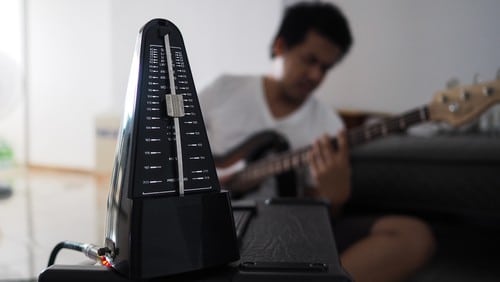Metronome practice is one of the most effective methods for improving your playing quickly, especially for technical, high tempo pieces. Unfortunately, for many of us it can also be a tedious way to practice and as a result is often overlooked or not done properly. Use these tips to maximise your metronome practice so you can spend less time with a metronome and more playing the fun stuff.

Go Slow To Go Fast
Learning songs at a very slow tempo is likely something that has been relentlessly drilled into you already, its especially important for metronome practice. Usually it is recommended that you should start your metronome far lower than you might think, as low as 50-60 bpm. By starting at a tempo this slow, you are forced to thoroughly understanding the rhythmic placement of each note in relation to the beat of the metronome. It is important to note that reducing the tempo much below 50-60bpm is not recommended. Slower than this makes it extremely difficult to keep time due to long pauses between each beat.
Take Small Steps
Once you are able to play the song fluently at a very low tempo, you can start to increase it. This increase should be very small. You should only ever increase the tempo by 1-5bpm at a time. By making small changes like this, the increase in speed is barely noticeable, and you will be able to adapt to it more quickly and accurately. It may seem tempting to increase by 10-20bpm, but you will likely end up struggling to play accurately with that big of a change and have to reduce the tempo again anyway resulting in lost time, and developing bad habits/mistakes.
Be Accurate
It is extremely important while using a metronome to be as accurate as possible. Small mistakes at a slow tempo will become large mistakes at a fast tempo. To maintain accuracy you should never increase the speed until you can play a section perfectly at least 3 times in a row. You should be able to play at the current tempo relatively effortlessly before increasing the tempo.
Tips For When You Get Stuck
With almost anything you learn, you will inevitably encounter a tempo that you struggle to get past. E.g you are learning a technical shred solo and can’t quite get the last 15 bpm you need. Here’s some tricks to gain that last bit of speed.
- Temporarily boost the speed to far beyond what your capable (e.g. full tempo of the song) and attempt to keep up with it a handful of times before reducing the speed again. When you reduce the speed back to where you started, it will feel relatively very slow and more achievable. Use this trick sparingly as using it too much will result in sloppy playing.
- Don’t be afraid to take a break if your struggling. Go for a quick walk, watch tv for half an hour, come back the next day. Whatever you need to do to clear your head and try again.
- Try breaking the practice up into small concentrated chunks. Try spending just 10 minutes of heavy focus on the part you’re stuck on, then do something else for 20. Come back and do another 10 minutes and repeat. You will find these small blocks of intense focus will yield better results than if you tried to bash away at it for hours on end.
- Drop the tempo back down and check for any small mistakes. Sometimes we can get stuck at a speed because we have progressed to fast and started making mistakes.
Practice Songs You Already Know With Metronome
The metronome isn’t just for learning new songs. It’s also a fantastic tool for keeping on top of what we have already learnt, particularly for technically challenging songs. You will find that even in songs you have know for years, sitting down with a metronome and practicing it slowly for a few minutes will dramatically improve how accurately you can play it..
Where Do You Get A Metronome
Luckily for you, you will already have access to a metronome through either a computer or mobile phone. Google has a built in free metronome app, all you have to do is search “metronome”. For practice that requires non-standard time signatures and subdivisions, there are many great mobile apps that offer these features for free. So there’s no excuse for not using one.
So next time you sit down to practise with a metronome, try using these tips to maximise your practice time. The better you are at using a metronome, the less time you’ll have to spend using it. You’ll become a much cleaner, more accurate and faster guitarist for it.
Interested in guitar lessons? We’d love to help! Get in touch today.
[button label=”Book your FREE LESSON” url=”https://guitargym.com.au/request-a-free-lesson” color=”#e21836″ target=”_self”]
